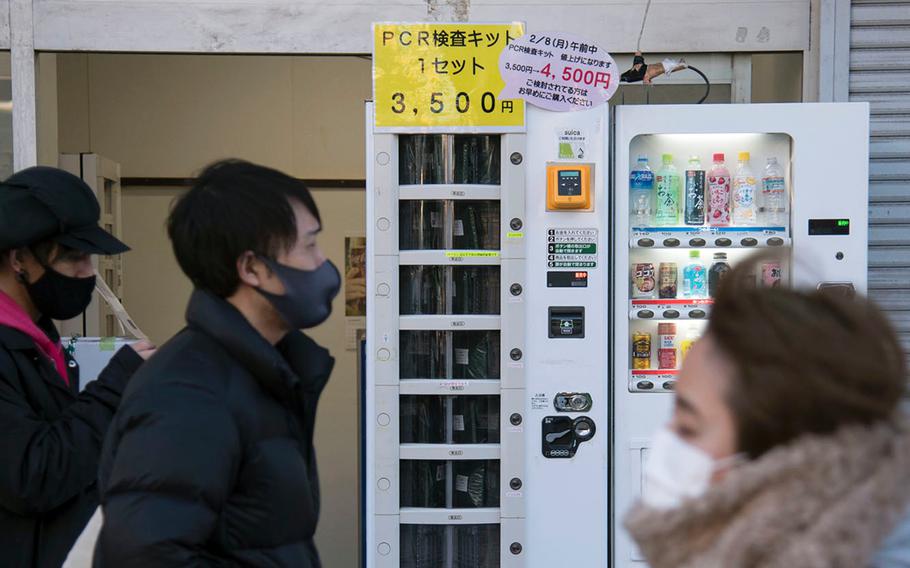Asia-Pacific
Coffee, noodles and coronavirus tests: Japanese vending machines sell test kits during the pandemic
Stars and Stripes February 5, 2021

People walk past a vending machine selling polymerase chain reaction kits, which test for the coronavirus, near Ofuna Station in Kanagawa prefecture, Japan, Thursday, Feb. 4, 2021. (Akifumi Ishikawa/Stars and Stripes)
Stars and Stripes is making stories on the coronavirus pandemic available free of charge. See other free reports here. Sign up for our daily coronavirus newsletter here. Please support our journalism with a subscription.
TOKYO — Vending machines can be found on almost any street corner in Japan, selling everything from sodas to ice cream and warm noodles.
Now, consumers in Tokyo and a neighboring prefecture can even find vending machines selling coronavirus test kits.
Vending machines in five locations in Tokyo and Kanagawa prefecture are selling polymerase chain reaction, or PCR, test kits for 3,500 yen, about $33. The price is set to increase by nearly $10 on Monday.
Tokyo, Kanagawa and two other prefectures that comprise the greater Tokyo metro area are under a state of emergency until March 7 due to a winter surge in new coronavirus cases. The surge was the worst of the pandemic thus far and is in decline.
The vending machines, which can be found near Shibuya, Osaki, Kanda and Ofuna stations as well as at Jyomyoin temple near Uguisudani, were installed to encourage people to take the test regularly, according to the website for Takenoko ENT Clinic, which provides the kits and analyzes the actual tests.
Kits were nearly sold out at the Osaki machine on Thursday, while the Shibuya and Ofuna machines were close to fully stocked.

People walk past a vending machine selling polymerase chain reaction kits, which test for the coronavirus, near Ofuna Station in Kanagawa prefecture, Japan, Thursday, Feb. 4, 2021. (Akifumi Ishikawa/Stars and Stripes)
Each kit comes with a sample container, zip-close bags, an informational form and an envelope to send the sample to the clinic in neighboring Saitama prefecture, according to the People vending machine company’s website.
After buying the kit, the subjects must deposit a saliva sample in the container, mix it with a saline solution to prevent it from hardening and mail the sample to the clinic.
The test subjects register their information and kit number on the clinic website. Within 24 hours of receiving the test sample, the clinic sends the subjects a website address where they can find their results, according to the clinic.
If the result is positive, the clinic will call the subject directly and also report the result to the clinic’s local health care center, the clinic said on its website. The subject will be asked to stay home until contacted by a local health care center.
Some limits apply. Anyone with symptoms of COVID-19, the coronavirus respiratory disease, should not take the vending machine test; neither should anyone who has traveled in the previous two weeks or has been in contact with someone already infected with the virus.
The clinic encourages anyone with symptoms or who has been in close contact with an infected person to see a health care professional.
Its large testing machine allows the clinic to provide tests much cheaper than other providers, according to the clinic.
“Let’s take tests once every two weeks to protect ourselves and the people you care about until the vaccines become widely available,” the clinic stated on its website.